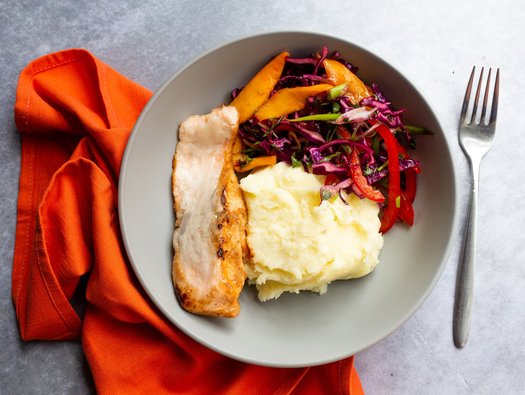Sticky jerk salmon with mash

This colourful, low salt dish is tasty and high in protein so is perfect for people on dialysis. For those that need to eat less potassium, just swap the potatoes for a portion of rice or couscous.

This colourful, low salt dish is tasty and high in protein so is perfect for people on dialysis. For those that need to eat less potassium, just swap the potatoes for a portion of rice or couscous.
½ onion, chopped
1 spring onion, chopped
2 red chilli peppers, chopped
2 garlic cloves, chopped
½ teaspoon Chinese 5-spice powder
½ teaspoon allspice
½ tablespoon ground black pepper
½ tablespoon fresh (or ½ teaspoon dried) thyme
½ teaspoon dried nutmeg or cinnamon
2 tablespoons reduced-salt dark soy sauce
2 tablespoons clear honey
4 salmon fillets (100-120g each)
600g potatoes, peeled and cubed
Juice of 2 lime or lemons
½ medium red cabbage, sliced
1 mango, peeled & sliced
1 red pepper, sliced
6 spring onions, thinly sliced
10g fresh coriander, stalks discarded
Black pepper, ground
50g unsalted butter
In a food blender, combine the onion, spring onion, chilli peppers, garlic cloves, herbs, spices, soy sauce and one tablespoon of the honey. Blitz until it comes together as a paste.
Place the salmon fillets into a large shallow bowl and spread the jerk paste all over both sides of each fillet. Set the salmon aside to marinate for a few minutes.
Peel and chop the potatoes and add to a saucepan, covered with plenty of water. Boil on a medium heat until soft. Drain and set aside.
Preheat the grill to medium. Place the marinated salmon fillets, skin side upwards, onto a foil-lined baking tray and grill for 8-10 minutes, or until the salmon is cooked through (be careful that the sweet jerk sauce doesn’t catch and brown too much – if necessary, move the tray lower in the grill).
Preheat the grill to medium. Place the marinated salmon fillets, skin side upwards, onto a foil-lined baking tray and grill for 8-10 minutes, or until the salmon is cooked through (be careful that the sweet jerk sauce doesn’t catch and brown too much – if necessary, move the tray lower in the grill).
In a large bowl, mix together the salad ingredients (red cabbage, mango, red pepper, spring onions and coriander). Mix the lime juice and remaining tablespoon of honey together and stir the dressing through the salad. Once the salmon is cooked, serve the mash with the dressed salad alongside and salmon fillet on top.
The potato is the main source of carbohydrate in this recipe, and the value has been provided for those who have been trained in insulin adjustment.
This recipe is high in potassium, mainly due to the potatoes. For those advised to lower potassium in their diet consider replacing the potatoes with rice or couscous.
This recipe is low in phosphate, however it does contain some phosphate, mainly provided by the salmon, therefore if you have been prescribed a phosphate binder you should take as directed.
This recipe is high in protein, therefore suitable for those advised to eat more protein, such as those receiving dialysis.
Frozen salmon is often cheaper than fresh. Just defrost thoroughly, in the fridge, before cooking.
This dish is best eaten freshly made.
Cooking for yourself or a loved one with chronic kidney disease doesn't need to be intimidating. Follow our top tips for kidney-friendly cooking success.
You can enjoy a wide variety of delicious and healthy food when you are living with kidney disease. All Kidney Kitchen recipes are analysed and approved by kidney dietitians. Search through our kidney-friendly recipes or filter them by category below.
This Caribbean-inspired dish is filling, easy to cook, and low in salt, potassium and phosphate.
By giving us your email address, you're giving us permission to send you the latest news from Kidney Care UK. Further information about how we protect and use your personal data is available in our Privacy policy. If you would like to change the way we communicate with you at any time please email [email protected]. You can unsubscribe at any time by using the link at the bottom of every email we send.